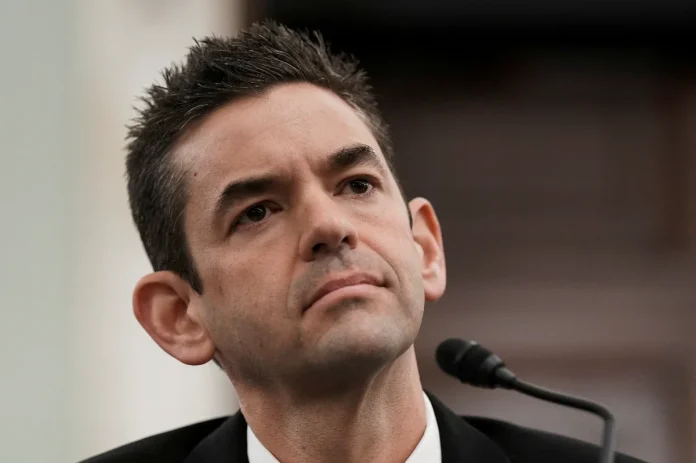President Donald Trump nominates private astronaut and Elon Musk ally Jared Isaacman to lead NASA, pending Senate confirmation.
WASHINGTON: President Donald Trump said on Tuesday he was re-nominating Jared Isaacman, the private astronaut and ally of fellow billionaire and SpaceX founder Elon Musk, for the post of NASA administrator, five months after Isaacman’s original nomination was withdrawn.
Isaacman, an e-commerce mogul who flew to orbit twice on all-private astronaut missions as a customer and collaborator with SpaceX, was removed from consideration to lead the space agency in late May amid a high-profile falling-out between Trump and Musk.
Sean Duffy, the head of the U.S. Department of Transportation, was named interim NASA chief in July.
At the time, NASA’s workforce of 18,000 and the space industry at large were being whipsawed by looming layoffs and proposed budget cuts threatening cancellation of dozens of U.S. science programs.
Nearly 4,000 NASA employees took buyouts the Trump administration offered in January and April, according to a union that represents about 8,000 space agency personnel.
The return of Isaacman as Trump’s nominee to fill the NASA vacancy on a permanent basis came about two weeks after Duffy said he was inviting other companies to compete with SpaceX for the agency’s marquee lunar landing contracting, leading to a public spat between Duffy and Musk over who should be leading the space agency.
Responding to reports that Duffy was looking to fold NASA into the Transportation Department, Musk wrote online last month, “The person responsible for America’s space program can’t have a 2 digit IQ.”
In a Fox News appearance a day earlier, Duffy said SpaceX’s development of its next-generation moon rocket, Starship, was falling behind schedule and could undermine NASA’s goal of returning humans to the lunar surface under the agency’s Artemis program, an effort rivaling China’s lunar ambitions.
By then, the agency had confirmed that Duffy and Isaacman were engaged in talks about possibly resurrecting Isaacman’s NASA nomination.
“This evening, I am pleased to nominate Jared Isaacman, an accomplished business leader, philanthropist, pilot, and astronaut, as Administrator of NASA,” Trump said on social media.
The role requires confirmation by the Senate, where Trump’s Republican Party holds a 53-47 majority.
Trump, as president-elect, tapped Isaacman last December to lead NASA at the recommendation of Musk, the SpaceX chief executive officer who had been an influential adviser to the president and sought to more closely align the U.S. space program with his goal of flying missions to Mars.
Isaacman, a billionaire investor and amateur jet pilot with thousands of hours of flight time under his belt, then spent months navigating the Senate confirmation process, balancing the desire of Musk and the Trump administration to focus on Mars with NASA’s multibillion-dollar strategy to return astronauts to the moon by 2027, ahead of China in a geopolitical race to the lunar surface.
“Jared’s passion for Space, astronaut experience, and dedication to pushing the boundaries of exploration, unlocking the mysteries of the universe, and advancing the new Space economy, make him ideally suited to lead NASA into a bold new Era,” Trump wrote in his post.
Isaacman, founder and CEO of the financial transactions service Shift4 Payments, was the commander and chief benefactor of the first all-private space crew to reach Earth orbit in 2021.
He led a four-member team of civilian rookie astronauts aboard a SpaceX rocket vessel on a three-day mission dubbed Inspiration4.
He returned to orbit in September 2024 with a follow-up commercial voyage that he again bankrolled, leading another quartet of private astronauts on a mission dubbed Polaris Dawn, in which he joined a SpaceX engineer in conducting the world’s first private spacewalk.
Hours before Trump announced his re-nomination, Isaacman restated on X some of the priorities that he said he had outlined during previous Senate testimony, including an emphasis on putting “more astronauts in space with greater frequency.”
Isaacman said he embraced the goal of returning American astronauts to the moon under the Artemis program to “determine the scientific, economic and national security reasons to support an enduring lunar presence,” before eventually shifting resources toward “the near-impossible that no one else will work on like nuclear electric propulsion.”
He also said he supported “maximizing the remaining life” of the International Space Station as part of a longer-term effort to build an “orbital economy” with various commercial interests. – Reuters








